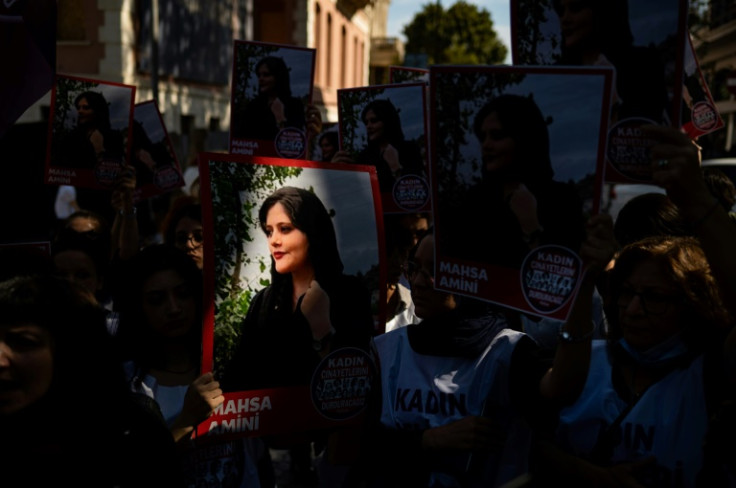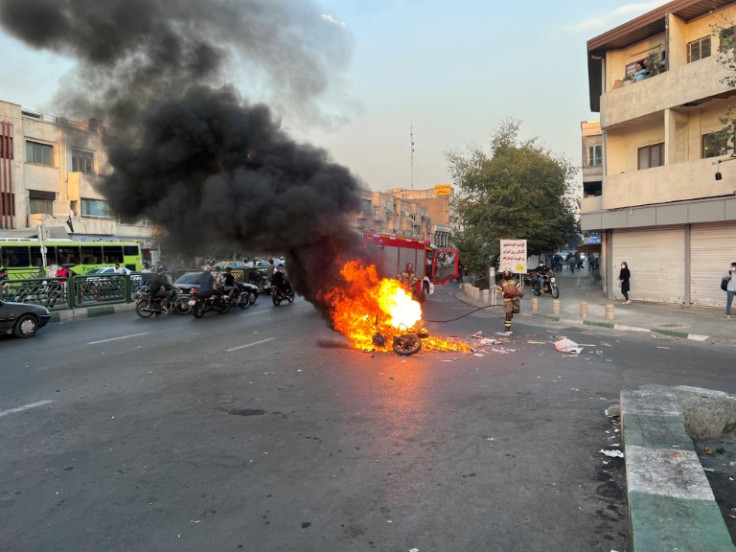Iran Accuses US Of 'Destabilization' As Protests Continue In 19 Cities
Iranian President Ebrahim Raisi blamed the U.S. for the protests that swept across 19 cities in the Islamic nation on Wednesday. Rasi accused the U.S. of using a "policy of destabilization" in a speech at a conference in Kazakhstan on Thursday.
The ongoing unrest began in response to the death of 22-year-old college student Mahsa Amini, who was detained by Iran's morality police on Sept. 13 and died three days later. Iran's government blamed Amini's death on an underlying health condition, however, her family says she was beaten by police and was kept in a coma as a result of her injuries.

Protests quickly swept across the country, with women publicly defying the country's dress code by removing their hijabs in public and cutting their hair. Women, students and schoolchildren have reportedly participated in the demonstrations, chanting "Women, Life, Freedom" as their rallying cry for the current social movement. The protests have expanded across the country into a direct challenge of Iranian authoritarianism.
The demonstrations have been met by a violent response, with police reportedly beating protesters, firing tear gas into crowds, and in some reports, opening fire on crowds. Iran Human Rights, a nonprofit organization based out of Oslo, Norway, estimated there have been 201 civilian casualties in relation to the demonstrations, including 23 children. Iranian authorities have reported 20 security force members have also died.
Oil workers in Southern Iran began striking on Monday and announced their support for anti-government protesters on Tuesday. The government states the oil worker strike is a labor dispute and not connected to the larger anti-government movement. Iran's current ferocity and civil unrest has been compared to the Green Movement in 2009.
Iranian Supreme Leader Ayatollah Ali Khamenei called the protests "scattered riots" and said they were incited not in response to Amini's death but by Iranian enemies, with Raisi doubling down Thursday by claiming the demonstrations were part of a Western plot.
The U.S. has openly supported the Iranian protesters, with U.S. State Department spokesman Ned Price stating in a press briefing on Wednesday the current U.S. focus "is on the remarkable bravery and courage that the Iranian people are exhibiting through their peaceful demonstrations."
When asked about the possible revival of the 2015 Iran nuclear deal, Price said it is not the current focus, adding that instead the U.S. is looking into ways to further support Iranian protesters. On Wednesday Deputy U.S. Secretary of State Wendy Sherman spoke at a roundtable meeting with over 20 global technology companies to discuss supporting internet freedom in Iran.
Iran has long censored and restricted internet access. The current crackdown has blocked access to social media channels and messaging apps such as WhatsApp.

When asked about the possible revival of the 2015 Iran nuclear deal, Price said it is not the current focus, adding that instead the U.S. is looking into ways to further support Iranian protesters.
On Wednesday Deputy U.S. Secretary of State Wendy Sherman spoke at a roundtable meeting with over 20 global technology companies to discuss supporting online freedom in Iran, which has long censored and restricted internet access. The current crackdown has blocked access to social media channels and messaging apps such as WhatsApp.
© Copyright IBTimes 2024. All rights reserved.





















